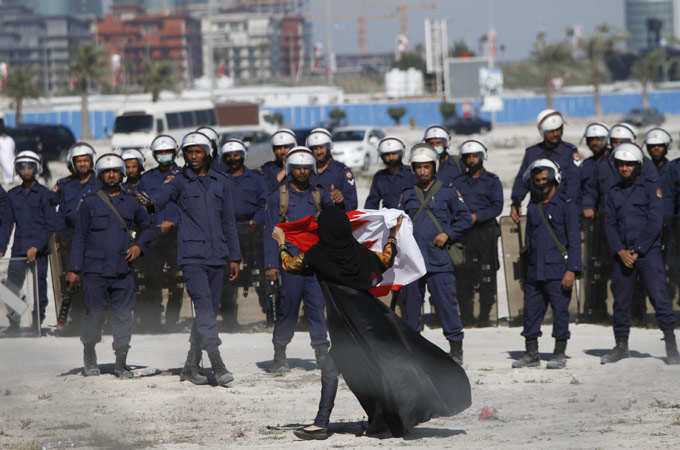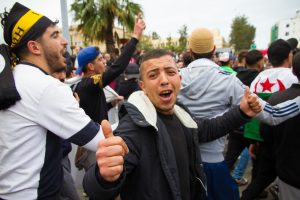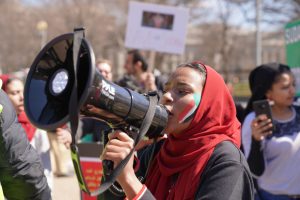via IPS News
The special session of the Bahraini National Assembly held on Sunday Jul. 28 was a spectacle of venom, a display of vulgarity, and an unabashed nod to increased dictatorship.
Calling the Shia “dogs”, as one parliamentarian said during the session, which King Hamad convened, the Al-Khalifa have thrown away any hope for national reconciliation and dialogue.
The 22 recommendations approved during the session aimed at giving the regime pseudo-legal tools to quash dissent and violate human and civil rights with impunity. All in the name of fighting “terrorism”.
Watching a video of some of the speeches during the session, one is saddened by how low official political discourse has become. Students of Bahrain yearn for the days when parliamentary debaters were civil and when Shia and Sunni parliamentarians engaged in thoughtful, rational, and tolerant debates despite their political or ideological differences.
In the early 1970s when the Constituent Assembly debated the draft constitution, Bahrainis followed the speeches by their elected and appointed representatives with much respect and hope for the future of a modern, tolerant, and civil society.
Such parliamentarians as Rasul al-Jishi, Jasim Murad, Ali Saleh, Abd al-Aziz Shamlan, Ali Sayyar, Isa Qasim, Qasim Fakhro, and others made their countrymen proud with the quality of debate that characterised Bahrain’s first ever elected parliament.
Even such ministers as Muhammad bin Mubarak al-Khalifa, Ali Fakhro, and Yusif Shirawi participated in those parliamentary debates and worked jointly with elected members to chart a more hopeful future for all the people of Bahrain.
As I sat through those parliamentary sessions in 1973 and followed the lengthy discussions on a myriad of constitutional amendments, I envisioned a democratically prosperous Bahrain for years to come. The National Assembly, however, was dissolved two years later, and the constitution was suspended. Al-Khalifa ruled by decree ever since.
The parliamentary special session last Sunday showed a divisive, intolerant, and fractured country that is rapidly descending into chaos. It’s as if civility, rationality, and moderation have become relics from the past.
King Hamad and the Crown Prince welcomed the recommendations, and the powerful prime minister urged his ministers to implement them immediately; in fact, he has threatened to fire any minister who slows their implementation.
According to media reports, the recommendations were prepared before the meeting and were disseminated to the media a few minutes after the session ended. They were not even debated meaningfully or rationally during the session.
The regime’s fear that Bahrainis would have their own “tamarud” (rebellion) civil disobedience movement to confront the regime on Aug. 14, Bahrain’s actual independence day, drove the timing of the session. The Bahraini opposition hopes to emulate the Egyptian “tamarud”, which indirectly led to Morsi’s removal.
Like other autocratic regimes, whether under Abdel Fattah al-Sisi in Egypt or Bashar al-Assad in Syria, Al-Khalifa justified the draconian recommendations against all forms of opposition and peaceful dissent in the name of fighting “terrorism” and incitement of “all forms of violence” (Recommendation #3). The regime will likely use these recommendations to ban all peaceful demonstrations and protests.
The regime is prepared, according to Recommendation #2, to revoke the citizenship of Bahraini citizens “who carry out terrorist crimes and those who instigate terrorism”. The regime defines a terrorist as any Bahraini who is suspected of being a dissident or actively advocating genuine reforms. In fact, Recommendation #6 bans “sit-ins, rallies and gatherings in the capital Manama”.
The regime does not seem perturbed by the fact that citizenship revocation violates international legal norms and the Bahraini constitution. In fact, this might be a sinister way for the Sunni al-Khalifa to alter the demographics of the country by depriving the Shia dissidents of citizenship.
Viewing the entire protest movement through the security prism, as the recommendations imply, the regime seems bent on escalating its crackdown against peaceful protest and freedoms of speech and assembly, according to the Bahrain Centre for Human Rights.
Under Recommendation #7, the country could soon be ruled under martial law or “National Safety”, as the regime euphemistically calls it.
The recommendations have put the country on a sectarian collision course, have dealt a major blow to peaceful dissent and civil rights, and have raised serious questions in Washington about Al-Khalifa’s commitment to genuine reform.
In a direct rebuke to U.S. Ambassador Thomas Krajeski, Recommendation #11 requests “that all ambassadors to Bahrain to not interfere in the kingdom’s domestic affairs.”
Some die-hard Sunni parliamentarians, with the support of the Royal Court, have urged the regime to expel Ambassador Krajeski from Bahrain, claiming he has been meeting with pro-democracy Shia dissidents. Others have threatened his personal safety.
Still others, with tacit regime support, are hoping the ambassador would be transferred out of Bahrain, much like what happened to political officer Ludovic Hood in May 2011.
At the time, according to the “Religion and Politics in Bahrain” blog, pro-regime Sunni activists demanded Hood’s removal because they claimed he offered “Krispy Kreme doughnuts to demonstrators who had gathered outside the American Embassy” to protest perceived U.S. support for Al-Khalifa.
Now pro-regime Sunni activists are feverishly campaigning against the U.S. ambassador’s public support for human rights and genuine reform in Bahrain. The recommendation curtailing diplomatic activities in the country is squarely aimed at Ambassador Krajeski.
According to Bahrain Mirror, some have advocated banning him from appearing on state media and in pro-regime newspapers, even if the subject he is discussing is gourmet cooking, one of the ambassador’s hobbies!
The anti-Shia and anti-reform underlying theme of the recommendations is a naked display of tribal family autocracy, which Al-Khalifa are determined to preserve at any cost, including tearing the society apart. Adopting these recommendations reflects the regime’s nervousness about the ever-increasing precarious nature of their rule and the unstoppable demands for justice, dignity, and equality.
According to a recently leaked audio recording, Crown Prince Salman was quoted as saying, “The current situation is unsustainable, and the policy we are pursuing cannot continue. People are getting tired, and conditions could worsen any moment. Bigger dangers are threatening our society, and the future is becoming more precarious.”
Washington and other Western capitals should work diligently to disabuse the king and the prime minister of the notion that “securitisation” is the answer to Bahrain’s domestic ills. Engaging with the public on the future of Bahrain, including the Shia majority and the pro-democracy youth movement, is the only way to bring the country back from the brink.
Washington should make it clear to Al-Khalifa that media attacks and threats against Ambassador Krajeski should stop. Whipping the flames of hatred against the U.S. embassy to preserve the regime’s dictatorial rule is a dangerous game, which Al-Khalifa cannot afford to engage in.
As a first and immediate step, King Hamad should muzzle the hotheads in his Royal Court and in the prime minister’s office. In the meantime, the U.S. should initiate serious discussions on how and when to move the Fifth Fleet out of Bahrain to a neighbouring country or over the horizon.






* The name of the political prisoner I referred to is Mohammed Albuflasa.
I think you brought up some very good points that I failed to stress on enough which are the fact that both government authorities and political opposition can have their own political agendas that aren’t generally helpful for those who have genuine concerns about reform and democratization. Yes, I think it is true that some individuals as part of Al Wefaq have used their positions as politicians in order to further a Shia-influenced political agenda.
Nonetheless, I think its equally unfair to call the entire movement false because there are still people who have genuine problems with the way in which things are being run and it is their right to express these concerns in a thoughtful, peaceful manner. Other individuals, unfortunately, do not have the same confidence in the democratic process and therefore we have many of the problems that we face today in terms of the amount of violence occurring during riots.
I wasn’t stating that you were affiliating yourself with any one side and if it sounded that way, then I apologize. I was just pointing out the fact that using the rhetoric about Iran’s interference and the restoration of Shia rule in Bahrain is a tired one. It doesn’t address the complexity and variety of problems we face today and I believe it should be abandoned.
I think that this use of rhetoric is part of the media problem we face, whereby people are trying to oversimplify problems and try to portray them in a Sunni vs. Shia light.
Furthermore, drawing comparisons between Bahrain’s standard of living and that of other countries does not help resolve issues either. This kind of view does not even begin to acknowledge that problems exist on the ground and therefore is useless for the resolution of conflict. Bahrain is not like other countries (whether thats better or worse) but I think we can all agree that it can always improve which is why we have to look at problems and issues critically and with open-minds in order to resolve people’s grievances.
Also, unfortunately, I cannot say much about the different aspects of the 2002 constitution or National Action Charter and the differences between public opinion at the time. I was too young to vote at that time, I am only 19 years old. But thats okay, many people make assumptions about my age. Also, I’m not sure if you are referring to me as a Shia when you say “you” but I am not Shia. I was raised Sunni Muslim. Its okay, it can be easy to make that mistake with how much the media wants use to believe in sectarianism.
I do not agree with using tactics of vandalism or terrorism in making governments listen. Unfortunately, I didn’t stress this in my previous comments. I think both sides have their own issues to resolve before any progress can be made towards peace and reconciliation. However, I also hold the belief that the government is greatly abusing its powers with some of the recommendations. The most concerning of which is the revocation of citizenship which can be a very disastrous thing to do to someone. Many people have lost their citizenship since 2011, many of them professionals who work in fields like education and healthcare. I believe that this is a step in the wrong direction and that the government isn’t doing enough to reconcile with the opposition’s problems peacefully. This is what I mean by securitization – they are trying to present the issue in terms of public safety and security which allows them to abandon their other obligations. This isn’t the kind of government I want. I want the democratic and free government that Bahrain says it is but is clearly not.
Furthermore, I cannot comment on the use of yellow symbolic items or anything relating to Hezbollah because I don’t know anything about this. Much of my concern is about the deterioration of the situation since March 2011. I think all of the past should be put behind us. Both sides should acknowledge the legitimacy of the other side’s point of view, then apologize. Only then can we move towards reconciliation. So far, this criteria has been incompletely met.
I do not think I can agree with your statements concerning the genuineness of the movement because thats an unfair accusation. The movement is made up of a variety of different people, opinions and political views and like you said, because its being led by Al Wefaq, much of it has become part of a political agenda. You cant delegitimize the concerns of all of these different people. The calls for a change in regime did not come out until after the government used excessive force to disperse protesters (which I think you might agree was the biggest mistake made in 2011. It disrupted public life. I couldn’t go to school. Many people couldn’t go to work. Others felt so threatened that they left the country. For the first time in history, the military was on the streets with armored vehicles and weapons. This wasn’t what anyone wanted, but the government seemed very keen to bring in as much force as they possibly could. More than what was required.)
I agree that Al Wefaq are not a good force of political opposition (even if we simply go by their stance on women’s rights). Nonetheless, people need to stop demonizing each other, put the past behind them, apologize and move towards peace and reform again.
Repeating the same question Brother Bader: What is the name of the Sunni advisor to the King who is imprisoned? appreciated.
Goodness, to have this opinion at the age of 19 today, as stated in your last sentence, is nothing short of revolutionary thinking. If only the powers to be, could embrace what you’ve said. I realize that it’s probably futile to believe that it could happen, but, there’s always that slight chance, it will catch fire in the minds of your peers, which may be the solution to the turmoil in the M.E. today. Bravo to you, for this sharing of a forward belief. Hopefully, more will embrace this same way of thinking, for it’s the 21st Century, way past the time for the old ways to die.
* The name of the political prisoner I referred to is Mohammed Albuflasa. I said this at the beginning of my post. I hope you find his story very interesting!
Thank you for the kind comments, Mr. Norman. Hopefully more people will understand that trying to return to the “glory days” of the past and trying to securitize the problem are both equally inadequate solutions to political and civil conflicts anywhere in the world.
It would serve everyone much better if they simply recognize the fact that problems exist, acknowledge people’s grievances with these problems and then work to find a solution that suits the interests of both parties and adheres to modern international standards.
Mohammed Albuflasa? Advisor to the King????? This is why I was somewhat skeptical. The King never had an advisor called Mohammed Albuflasa. Mohammed Albuflasa is or was probably a one off small time Sunni punk who came to limelight in the roundabout when he spoke against the government. His rhetoric suited the Shia dominated opposition so they made an icon of him. There is much more to it Bader than you taking things plainly and at face value.
When you say the “Down with the system” “Down with Hamad” rhetoric emerged only after the use of force to clear a vital roundabout in the capital Manama I become very skeptical Bader. The Bahrain Shia disgust for the Alkhalifa rule is very deep rooted for centuries, as I mentioned in my previous comments. The events of February 14, 2011 were just an excuse.
You see Bader, this is the sort of disinformation people like me and many others hate because it destroys every path to building confidence. This is very much similar to an old English saying “When you make a misspelling it means you have forgotten a Zero somewhere”. This is why I am now a bit skeptical with your ethnic orientation, but for the time being I am going to take everything you said about yourself at face value.
My initial problem with Emile Nakhleh article was his reliance almost entirely on pre 1979 Iranian revolution events to base his views and opinions upon. Starting 1979 onwards the world is a different creature. This is why I had to refute Emile Nakhleh’s article entirely.
Bahraini Shias as well as Shias all over the world became very much militant and embarked on a political agenda, inspired of course by the Khomeini Welay Faqih doctrine. Basically, the Shias of today have no resemblance to the Shias of Pre 1979. This is the reason why, regrettably, this issue of ethnicity, loyalty, maturity, etc. is taking center stage importance ahead of the usual rhetorics of human right, freedom, equality, distribution of wealth, etc., in this part of the world.
Now we really need to agree on few basic principles before we can move forward. I need to know whether or not you agree with the 98.4% of Bahrain population who voted for the two chamber constitutional monarchy system. I need to know whether or not you are with the 2002 constitution, because if not then there is little point of going forward, and if yes then may be you are agreeing that the venue for voicing out the concerns and problems is the parliament. I need to know whether or not you acknowledge the fact that the Shia dominated opposition Alwefaq were part of the democratic process. The reason I am asking these question is to establish the nature of this Shia dominated opposition of Alwefaq whether it’s religiously driven or secularly.
You see Bader the vast majority of your views and opinions are very nice but remain much rhetorical and regrettably can’t be implemented in this day and age of globalization. Of course Bahrain has problems but then who hasn’t? As far as I am aware the western world has far more problems and poverty than Bahrain but I don’t see them going on the rampage with arsons, killings, destruction of public assets, blocking highways, etc.
Why can’t Bahrain Shia dominated opposition, and Alwefaq in particular, follow suit and become civilized like the west?